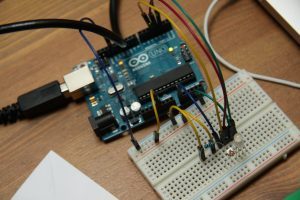You’re here probably because someone in your life has influenced you in picking a career in engineering. Let me guess, it was your high school science teacher, a parent, or a family friend. Am I close?
So, you did some research and you realized there’s this type of engineering that lets you work on pretty much everything: electronics, mechanics, programming. You’re a Type-A person who doesn’t like to just be “good” at things, you like to excel at them (You’re the leader of the pack). So why not excel at all types of engineering (well, at least the major players). Does that sound like you?
Or, maybe you’re not that person. Maybe you got “talked” into engineering. You want to be a musician or a personal trainer or a motivational speaker, but someone told you “that doesn’t make money: become an engineer, or a dentist, or a doctor, or an engineer…”
Engineering stuck out. It made sense. You’ve been pretty good at science. Why not make a salary upwards $70K when you graduate. Sounds pretty great, right?
Before Getting Your Robotics Degree, Read This
Let me take a quick little minute an introduce myself. I’m Liz. I studied Robotics Engineering at WPI. Let’s rephrase that. I graduated with my Bachelor of Science in Robotics Engineering from WPI. So I didn’t just study robotics. I do have a degree in it. You can read a little more about my thoughts on WPI’s Robotics Engineering program here.
I had zero intentions of becoming an engineer, let alone a robotics engineer. Funny thing is, I wanted to become a lawyer. (I was good at Social Studies but realized quickly I wasn’t interested in arguing with people for the rest of my career. Sorry to all you lawyers out there.) My math & science scores were high, so, I, like you, was pushed in the direction of becoming an engineer in high school.
What does robotics look like as a career?
I decided to write this article to give you my thoughts on a degree in robotics engineering, and what the “engineering market” looks like post-graduation. I hope this helps you as you’re trying to map out your life. But really, whatever choices you make now are not 100% indicative of what you’ll be doing 3, 5, or 10 years from now! The beauty of being able to choose is that you can always make another choice later.
With all that rambling aside, let’s get a couple of definitions out of the way. For this article, I’m going to refer to a degree in Robotics Engineering or Robotics as the intersection of mechanical engineering, electrical engineering, and computer science. This means that someone with a robotics degree has familiarity with these areas but may not have concentrated in any of them.
What the heck can you do with a Robotics Engineering degree?
The answer to this is kind of loaded. You can do whatever you want.
But Liz, why the heck would I pay $200K+ to get a degree in Robotics Engineering if I’m going to do whatever I want? Couldn’t I just go and do it?
I’m glad you asked that. Yep. You could. My biggest recommendation while you’re going into the field of robotics is trying to find one aspect or specialty that resonates with you.
Do you LOVE designing circuits? Then maybe your path will be specializing in sensors and control boards for robotic systems. Are you more of a programmer but like working with applied systems? Then become good at writing software – C, C++, and Python are all popular languages in robotics. If you can master any of the skillsets within robotics, then you’ll easily be able to narrow down the job pool and find relevant jobs.
A more specific answer to this question looks at a career pyramid that I posted on Instagram a few weeks ago.
https://www.instagram.com/p/Bf82cE-lm51/
Robotics is a Two-Faced Coin
From my experience, Robotics is segmented into two main categories: 1) Research & Start-up Robotics and 2) Manufacturing & Industrial Robotics.
Research & Start-up Robotics
As you might expect, research & start-up robotics is more focused on “smart” robots. What I mean by that, is that the primary focus is to innovate using Artificial Intelligence and sophisticated algorithms. It’s pretty common to find people in these areas working in the Robot Operating System (ROS) and writing programs around Obstacle Avoidance, Object Recognition, Navigation, Simultaneous Localization and Mapping (SLAM), Computer Vision, etc.
Here’s a video from my robotics course on SLAM & Path-Planning Using the TurtleBot 2. While this isn’t my solution (I wasn’t smart enough to create a video from the course, ha.), it will give you an idea of what robots in this space look like.
Subscribe to YouTube
These robots are extremely smart and therefore will require a very strong background in algorithms, computer science, and data analytics. If you’re looking to get into autonomous vehicles, self-driving cars, autonomous aerial vehicles (drones), etc, then this is the side of robotics you’ll be looking to get into.
Most commonly, these types of roles are in research (requiring Master’s and/or Ph.D.’s), at Universities, and found in start-ups. If you’re the kind of person that likes computer science and like scripting solutions to complex problems, then this would be a great place to start!
Manufacturing & Industrial Robotics
So this is a different beast. It’s a complete 180 from research robotics. Manufacturing & Industrial Robotics focuses on designing automated systems to support manufacturing, assembly, and production. When I say Industrial Robotics, I’m referring to Fanuc, ABB, Universal, and KUKA robots. Industrial robots have their controller and pendant for on-board programming.
Subscribe to YouTube
They’re slightly “dumber” than research robots because they’re typically receiving a signal from a PLC (Programmable Logic Controller) to move, pick, or react. There is very limited decision-making that robots do.
Now, I’m sure some of you reading this are like, wait, Liz, you forgot…What about ROS Industrial?
Thanks for your question. Manufacturing & Industrial Robotics has been my wheelhouse for a few years now. Based on my limited knowledge of ROS-I, I don’t think it’s ready for a production setting. The goal of every manufacturing site is to meet exceed their production needs. That means equipment (automated or not) MUST be able to handle repetitive tasks, reliably and consistently. When you bring a computer into an industrial environment, it isn’t as reliable as a PLC. That’s why manufacturing robotics is rather stupid, in comparison to the Research Robotics field. I suspect that as technology becomes better and easier to configure, ROS-I will be a game-changer for the future of manufacturing. I also suspect that we’re at least 5 years away from seeing this wave hit the industry.
With that said, if you like troubleshooting (being a detective), are interested in a high-pressure environment, and like working on large-scale systems (conveyors, robots, palletizers, industrial rigs, etc.), then this might be a better fit for you. Industrial Robotics will open your eyes to how machinery in large corporations work, and how your cells impact day-to-day operations. It can be highly frustrating (like any part of robotics), but very rewarding to be able to problem-solve on the fly.
What area(s) in robotics interest you most?
Now that you have an overview of the two sides of robotics, it’s time for you to do some self-reflecting. Here are some questions to help with this process:
- What kind of environment do you want to work in?
- What types of projects give you the most satisfaction?
- Do you like to work under pressure or at a slower pace?
- Do you like working on large-scale automated systems or would you rather write algorithms?
Take your time answering these questions, and don’t feel like there’s a right or wrong way to go. Like I said earlier in the article, just because you choose to go in one direction, doesn’t mean you have to stay there forever.
You can always make another choice and do something different. It is helpful though to determine your focus that way you don’t get overwhelmed trying to study everything. Pick topics that interest you, and if you have any questions that I can help you with, feel free to leave a comment below!
Next Steps: My recommendations to get started
I’m going to leave you with a list of recommendations for continuing robotics. I’ve divided this list into three areas: Mechanical, Electrical, and Computer Science Recommendations.
Feel free to screenshot/print this out and use it as you develop your robotics skills! I’ll expand on this list as I find additional useful resources.
Mechanical:
- Computer-Aided Design (CAD) Software: AutoCAD, Solidworks
- VEX Robotics Kit (iQ, EDR)
- Basic toolbox (hammer, screwdrivers, Allen wrenches, pliers, calipers, etc.)
- Arduino Robotics Kit (I’m a huge fan of the Elegoo Smart Robot Car V3.)
- 3D Printers: Anet A8, FlashForge, Robo3D R1, Robo3D R2
Electronics:
- Starter Electronics Kit: Arduino Uno, Sensor Kit
- Learn to Solder: Soldering kit (this is the one I have)
- Understand how to use a multimeter
- Build your own PCB’s (Altium, KiCad, TinkerCad)
- Safety Courses: NFPA 70E Standard for Electrical Safety, CPR, AED/First Aid
- PLC Courses: Allen Bradley ControlLogix, Siemens, Panel View HMI courses
Computer Science for Robotics:
- Popular Languages: C, C++, Python
- Learn to Program in C
- C++ for Absolute Beginners
- Beginner’s Guide to Python (Learn Python in 1 Week)
- Getting Started with Arduino (Article | Book | Kit)
- Online ROS course
- ROS textbook
- Robotics Demystified by Edwin Wise




